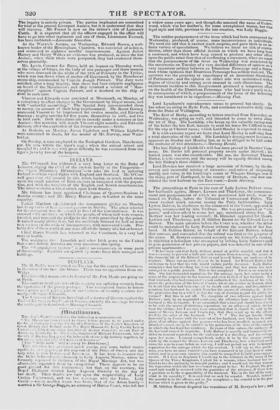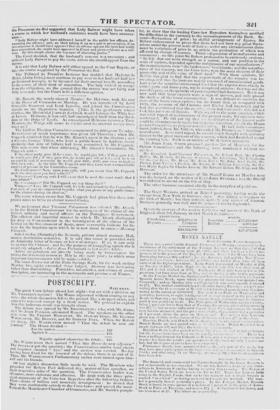The proceedings at Paris in the case of Lady Lytton
Bulwer verses her husband's agents, Messrs. Lawson and 'fliackeray. the commence- ment and postponement of which we mentioned last ;reds, were re- sumed on Friday, before the Tribunal of Correctional Police. The cause excited much interest among the Paris fashionables. Lady Lytton Bulwer, in obedience to the command of the Court, appeared io person, accompanied by 'l'rollope. She was pronounced an " ele- game," and when asked to name her age, mentioned thirty-five. M. Ilerryer was her leading connsel; M. Blanchet appeared for Messrs. Lawson and Thackerity, and M. Odillon Barrot for Sir Edward Isyttrot Bulwer. The main question before the Court was, whether the action could be maintained by Lady Bulwer without the consent of her hus- band. M. Odillon Barrot, on behalf of Sir Edward Bulwer, refused that consent, and contended that the refusal was fatal to the progress of the cause. III. Berryer commented. severely on Sir Edward's conduct, in shielding a defendant who attempted by bribing. Lady Iltilwer's maid to pin possession of her private papers, and was detected in one of her private apartments- " It has been said that Lady thilwer aimed at public srantlab and that it was 1.,:eessary to prevent to bold and rash woman from revealing the secrets of the domestic life of Sir Edward Bulwer and herself betide an audience of fo- reigners. 'There was no such &sneer to be feared. Sir Edward ihilwer had DO reason to fear that his wile would violate piddle devortim. Lady Matrix complains that her dacelling 11111,■ ht•cn violated, and that her name tails been outraged its a public pittroal. 'lids is her complaint. There is no scatelal is this She has demanded repitratimi for the outrage it her name under a sense of the respect due to her honour, and even to that of her littsimml. Yet that husband, who had consented tat told authorized the residence or his wife, ttuder the protection of the laws ol France, algae she resides in honour, when he heard that she had been exp.,. Cal to insult end outrage, and demanded re- paration, has hastened to snatch from her the means of obtaining it. Is this the protection due to a wife? is this the way of showing regard hut polilic de- corum? But this is not all. We complain of two offences against Lady Bulwer ; and, by an unguarded ailini,sion, the offenders have tletecimed the husband as the instigator. 111115 astokiskol that a husband shoold have denied to his wire the meatus Or obtaining reparation for aim or whirl she has bceo it(' tined; hot I 1011 lin11•C astonished that it :11°10;1 be said in the name rat Lawson :mil 'Vinod:tray, that they acted op to the otfeare
itself by for order of the husband. * * * * The foreign female. Heins
bottooral Fraerc with the con,,Att or her husband, and who has to com- plain ratan olletire against ber ',Trion—who has !welt insulted, menaced, anal utlauked--1114,t Sal nil' Lc entitled to the ilniterthIli of tan' low, or the country in ■■1111•11 she Imo in:c11 her ri:Sillenee. Lt caries of this nature, the authority of the lolit.'oalid calawit realoinite. Bulwer is morally and honourably en- tilled to deinand reparation tor th.• a itlinfioll or k_r dwelling, and the outrage upon her flume. I raileot a,wprrLvud, unless it lie by the strange avowal made by time counsel for Alessi.s. L nv>um and Tbaeleera).;how at husband could vocal the seas tat clam: betide its mud say, I will not permit tny wile to demand reparation tr,r the outrage iiljcIt !lie hats received. 1 will say to this geode- onus, you have no 11101e rel/Unnel'll it by your deed of sepa- ration, mid in your own country youwould be compelled to fulfil your engage- molds. If I were lit England, would stay to the ttibunal, in the name of the queen of the 'Three Kingdoms, 1 plead fur a woman, whose husband has re- fused to her his authority to demand justice; and I would u.sk lite that woman the reparation which the law tella bound to grant to her. In England, the per- sonal suit would Ise received with the guarantee of the attorney, if there were a question at to the responsibility of the husband. This is the law of the rase: whit is its morality ? It is staid that we seek for scandal. Scandal, indeed: the scandal is in the (deuce, not in the complaints ; the scandal is in the pro- tection which is given to the guilty."
M. (Milton Barron disputed the soundness of M. Iferryer's law ; and
the Procureur-du-Roi suggested. that Lady Bulwer might have taken a course ill which her husband's assistance would have been unneees-.
sary-
e Lady Bulwer might have addressed herself to the public law officers, de-
nouncing the offence; and, on their taking it op as a pub ic prosecution, if on investigation it should have appeared that an offence against the laws bad really been committed, she might have appeared in Court and given evidence as a wit- ness. Bv this simple course she was sure of obtaining justice." The Court decided, that the husband's consent was necessary ; and ordered Lady Bulwer to pay the costs, unless she should appeal from the
decree. It is said that Lady Bulwer will either appeal to the Cour Royale, or
take the course suggested by the Proeureur-du-Roi.
The Tribunal de Pretnii!re Instance has decided that Madame de melee (Julia Grisi,) must continue to pay over to her husband half her professional receipts, to be invested for their mutual benefit, according to the terms of their deed of separation. The lady wished to escape from the (ffiligetion, on the ground that the money was not fairly and fully invested; but the Court held a different opinion.



























 Previous page
Previous page